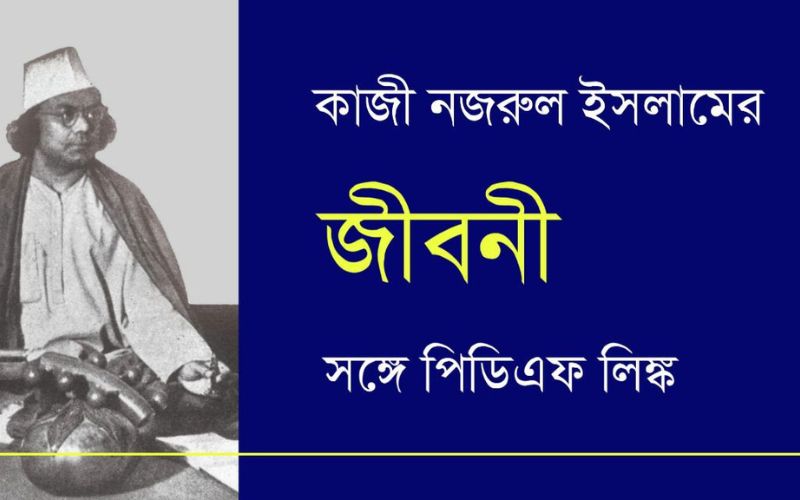Kazi Nazrul Islam, often referred to as the “Rebel Poet” of Bengal, was a prolific writer, composer, and revolutionary who left an indelible mark on Bengali literature and the Indian independence movement. His powerful poetry, laced with themes of defiance, social justice, and spiritual awakening, has inspired generations of readers and activists alike.
Early Life and Education of Kazi Nazrul Islam
Kazi Nazrul Islam was born on May 24, 1899, in the village of Churulia, located in the Burdwan district of West Bengal, India. He was the son of Kazi Fakir Ahmed, a mosque muezzin, and Zaheda Khatun, a pious and devoted homemaker. From a young age, Nazrul was exposed to the rich tapestry of Bengali culture, including the recitation of the Quran, the chanting of Sufi hymns, and the storytelling traditions of his community.
Nazrul’s formal education began at the local Madrasa, where he studied Arabic, Persian, and Islamic scriptures. He later attended the Searsole Raj High School, where he honed his skills in Bengali literature and poetry. Despite the financial challenges his family faced, Nazrul’s thirst for knowledge and his innate talent for writing and composing music soon became evident.
Nazrul’s Contribution to Bengali Literature
Kazi Nazrul Islam’s literary career began in the early 1920s, when he started publishing his poems in various Bengali periodicals. His debut collection of poems, “Agniveena” (The Fiery Lute), was published in 1922 and immediately captured the attention of the Bengali intelligentsia. Nazrul’s poetry was characterized by its bold, revolutionary tone, its defiance of social and political oppression, and its deep spiritual undercurrents.
Throughout the 1920s and 1930s, Nazrul continued to produce a prolific body of work, including poems, songs, plays, and novels. His poems, such as “Bidrohi” (The Rebel) and “Anandalahiri” (The Waves of Joy), became iconic expressions of the Bengali spirit, resonating with the masses and inspiring the Indian independence movement.
Nazrul’s versatility as a writer was further showcased in his literary contributions to the Bengali stage. He wrote numerous plays, including “Bidrohi” and “Rangeen Pankhir Pala” (The Tale of a Colorful Bird), which explored themes of social injustice, religious harmony, and the human condition.
Nazrul’s Revolutionary Poetry and Activism
Kazi Nazrul Islam’s poetry was not merely a reflection of his literary genius; it was a powerful tool for social and political change. His revolutionary poems, such as “Bidrohi” and “Purba Pashchim” (East and West), became rallying cries for the oppressed masses, challenging the status quo and calling for a more just and equitable society.
Nazrul’s activism extended beyond the realm of literature. He actively participated in the Indian independence movement, lending his voice and his pen to the cause of freedom. He was a vocal critic of the British colonial rule and supported the non-cooperation movement led by Mahatma Gandhi.
Nazrul’s revolutionary fervor and his unwavering commitment to the principles of social justice and equality often brought him into conflict with the authorities. In 1923, he was arrested and imprisoned for his political writings, an experience that had a profound impact on his life and his art.
Nazrul’s Involvement in the Indian Independence Movement
Kazi Nazrul Islam’s involvement in the Indian independence movement was a testament to his unwavering commitment to the cause of freedom. He actively participated in the non-cooperation movement and lent his voice to the call for self-rule.
Nazrul’s poems, such as “Bidrohi” and “Purba Pashchim,” became rallying cries for the oppressed masses, inspiring them to rise up against the colonial rule. His plays, too, often explored themes of social injustice and the struggle for independence, further solidifying his reputation as a revolutionary artist.
In 1923, Nazrul was arrested and imprisoned for his political writings, an experience that had a profound impact on his life and his art. Despite the hardships he faced, Nazrul remained steadfast in his support for the independence movement, using his poetry and his voice to inspire and empower the people.
Imprisonment and the Impact on Nazrul’s Life
Kazi Nazrul Islam’s imprisonment in 1923 for his political writings had a profound impact on his life and his art. During his time in jail, Nazrul continued to write and compose, producing some of his most powerful and poignant works.
The experience of incarceration, coupled with the physical and mental toll it took on him, left an indelible mark on Nazrul’s psyche. His poetry became increasingly introspective, exploring themes of suffering, resilience, and the human condition.
Despite the hardships he faced, Nazrul remained steadfast in his commitment to the principles of social justice and equality. He continued to use his art as a vehicle for social and political change, inspiring and empowering the masses even from behind bars.
Nazrul’s Later Years and Declining Health
As Nazrul entered the later stages of his life, his health began to deteriorate, and he faced a series of personal and professional setbacks. In the 1940s, he experienced a mental breakdown, which was exacerbated by the trauma of his imprisonment and the political turmoil of the time.
Nazrul’s declining health, coupled with the financial challenges he faced, forced him to retire from public life. He spent his final years in relative obscurity, living with his family and receiving limited support from the government and the literary community.
Despite the hardships he faced, Nazrul’s legacy as a revolutionary poet and a champion of social justice remained intact. His works continued to inspire and influence generations of readers and activists, and his name became synonymous with the struggle for freedom and equality.
Legacy and Recognition of Kazi Nazrul Islam
Kazi Nazrul Islam’s legacy as a legendary Bengali poet and a revolutionary figure is firmly cemented in the annals of history. His works have been translated into numerous languages, and his influence has transcended the boundaries of Bengal, inspiring writers, activists, and thinkers around the world.
In recognition of his immense contributions to Bengali literature and the Indian independence movement, Nazrul has been bestowed with numerous honors and accolades. He was awarded the prestigious Jagattarini Medal by the University of Calcutta in 1945 and was later conferred the title of “National Poet of Bangladesh” by the Bangladeshi government.
Nazrul’s legacy continues to be celebrated and commemorated through various cultural and academic initiatives. His birth anniversary is observed as “Nazrul Jayanti” in West Bengal and Bangladesh, and his works are studied extensively in schools and universities across the region.
Popular Works and Poems by Kazi Nazrul Islam
Kazi Nazrul Islam’s literary legacy is marked by a diverse and prolific body of work, spanning poetry, songs, plays, and novels. Some of his most renowned and influential works include:
- Poems:
- “Bidrohi” (The Rebel)
- “Anandalahiri” (The Waves of Joy)
- “Purba Pashchim” (East and West)
- “Agniveena” (The Fiery Lute)
- Songs:
- “Durg-Dol” (The Fortress Sways)
- “Jhankar” (The Resonance)
- “Chol Chol Chol” (Let’s March On)
- “Bolbo Tomay” (I’ll Tell You)
- Plays:
- “Bidrohi” (The Rebel)
- “Rangeen Pankhir Pala” (The Tale of a Colorful Bird)
- “Khilap” (The Breach)
- “Titas Ekti Nadir Naam” (The Name of a River is Titas)
These works, along with countless others, have cemented Kazi Nazrul Islam’s status as one of the most influential and celebrated literary figures in the history of Bengal.
Conclusion
Kazi Nazrul Islam’s life and legacy serve as a testament to the power of the written word and the transformative potential of art. Through his revolutionary poetry, his unwavering activism, and his unwavering commitment to the principles of social justice and equality, Nazrul has left an indelible mark on the cultural and political landscape of Bengal and beyond.
As you continue to explore the life and works of this legendary figure, may you be inspired by his spirit of defiance, his passion for justice, and his enduring legacy as a true champion of the people.
To delve deeper into the life and works of Kazi Nazrul Islam, we invite you to explore our extensive collection of his poems, songs, and literary works. Discover the power of his revolutionary voice and the enduring impact of his art on the Bengali and global literary landscape.



